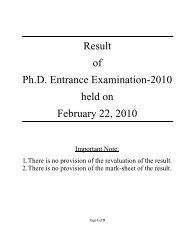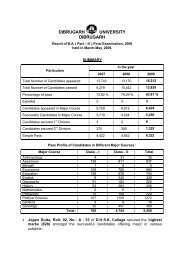Document file:///D|/Export1/www.netlibrary.com/nlreader/nlreader.dll ...
Document file:///D|/Export1/www.netlibrary.com/nlreader/nlreader.dll ...
Document file:///D|/Export1/www.netlibrary.com/nlreader/nlreader.dll ...
You also want an ePaper? Increase the reach of your titles
YUMPU automatically turns print PDFs into web optimized ePapers that Google loves.
<strong>Document</strong><br />
perfect-market models are easier to build, but the same methods applied to imperfect markets can also<br />
produce striking and unexpected insights.<br />
But, you may ask, why restrict ourselves to these particular building blocks? Why, in particular, must<br />
economic reasoning be based on the assumption of self-interested, rational behavior? Why can't we<br />
build models based on more realistic psychological premises, or on a more historically based<br />
understanding of institutions? Or why can't we take into account the fact that tastes and motives are<br />
themselves socially determined, and build a field of ''socioeconomics?"<br />
Page 77<br />
I don't have any fundamental answer to these questions. In the long run we may suppose that economics<br />
will be part of an integrated social science, just as genetics has be<strong>com</strong>e a branch of biochemistry, which<br />
in turn is understood in principle if not often in practice to be grounded in quantum mechanics. Indeed,<br />
in the very longest run everything will be grounded in quantum mechanics. As an empirical proposition,<br />
however, attempts to find alternatives to the economist's formula of self-interest plus interaction or, to<br />
use the title of a marvelous book by Thomas Schelling, Micromotives and Macrobehavior have been<br />
notably unsuccessful.<br />
Consider, for example, the repeated efforts of heterodox economic thinkers to find alternatives to the<br />
rational, profit-maximizing firm like John Kenneth Galbraith's claim that modern corporations are in the<br />
hands, not of their stockholders, but of a "technostructure" driven by bureaucratic imperatives. Did<br />
these attempts lead anywhere? Surely the answer is no: once you get past the impressive-sounding<br />
neologisms, theories like Galbraith's make few useful predictions; and what he claimed as deep<br />
<strong>file</strong>:///<strong>D|</strong>/Export2/<strong>www</strong>.<strong>netlibrary</strong>.<strong>com</strong>/<strong>nlreader</strong>/<strong>nlreader</strong>.<strong>dll</strong>@bookid=409&<strong>file</strong>name=page_77.html [4/18/2007 10:30:34 AM]
















